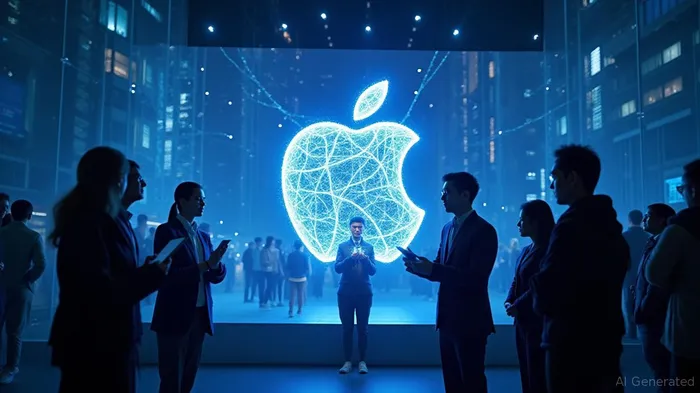Apple's Perplexity Gambit: A Bold Move to Own the AI Future
The tech world is abuzz with whispers of Apple's potential $14 billion acquisition of Perplexity AI, a startup whose conversational search engine technology could redefine the Cupertino giant's role in the AI revolution. If realized, the deal would mark Apple's most ambitious foray into AI to date, positioning it to challenge Google's dominance in search while addressing its lagging position in generative AI. For investors, the move underscores Apple's resolve to transform its ecosystem into an AI-first platform—or risk ceding ground to rivals like Meta and Google.

Strategic Imperatives: Why Perplexity Matters
Perplexity's core asset is its large language model (LLM)-powered search engine, which delivers context-aware, conversational answers in real time—a capability that could supercharge Siri, Apple's virtual assistant, and unlock entirely new AI-driven services. Consider the stakes: Apple's $20 billion annual deal with Google for default search placement on Safari highlights its reliance on a competitor's technology. By acquiring Perplexity, AppleAAPL-- could develop an in-house search engine, reducing dependency on Google while capturing user data to refine its AI models.
The synergies extend beyond search. Perplexity's LLMs could enhance Apple's Core ML framework, enabling more intuitive interactions across devices like iPhones, Macs, and HomePods. Analysts speculate that an AI-powered “Siri 2.0” could rival Google Assistant or Amazon's Alexa, turning Apple's hardware into a hub for personalized AI experiences. Meanwhile, the deal's $14 billion price tag—surpassing the $3 billion Beats acquisition—signals Apple's willingness to pay a premium for cutting-edge AI talent and technology.
Market Dynamics: A Race Against Time
The AI search market is projected to grow to $379 billion by 2030, but Apple risks losing share to rivals already entrenched in the space. Google's search revenue alone hit $162 billion in 2022, while Meta's investments in LLMs and its recently unveiled AI assistant threaten to erode Apple's ecosystem advantages. Perplexity's rapid growth—20% month-over-month query increases—suggests a growing appetite for AI-driven search alternatives, a trend Apple cannot afford to ignore.
The chart reveals Apple's relative stagnation in AI-driven revenue streams compared to its rivals, underscoring the urgency of the Perplexity deal.
Risks: Valuation, Regulation, and Integration
The acquisition is not without hurdles. At $14 billion, the price may strain Apple's cash reserves, especially if it prioritizes acquisitions over shareholder returns like dividends or buybacks. Regulatory risks loom large: the European Union's Digital Markets Act and U.S. antitrust authorities may scrutinize whether the deal stifles competition in search or AI. Critics also warn that integrating Perplexity's LLMs with Apple's closed ecosystem could exacerbate concerns about data privacy and algorithmic bias.
Technical challenges must also be navigated. Perplexity's open-ended conversational model contrasts sharply with Apple's traditionally “closed” approach to software, which prioritizes control over customization. Merging the two could require significant retooling of existing systems like Siri, a process that might divert resources from other priorities.
The Bull Case: A Decade-Long Payoff
Despite these risks, the strategic rationale is compelling. By acquiring Perplexity, Apple gains a foothold in the generative AI arms race, a domain where its hardware-software-AI integration could become a unique selling point. Imagine an iPhone that not only recognizes your face but anticipates your needs via a search engine powered by Perplexity's models. Such capabilities could extend Apple's product lifecycle, driving upgrades and subscriptions in a market where hardware sales are flattening.
Moreover, the deal could catalyze a broader shift in Apple's AI strategy. The company has historically lagged in AI talent, but Perplexity's team—including its LLM experts—could help bridge that gap. With $256 billion in cash reserves (as of Q1 2025), Apple has the financial flexibility to absorb the upfront costs while reaping long-term gains.
Investment Implications
For investors, the Perplexity acquisition is a litmus test for Apple's ability to evolve beyond its hardware-centric roots. If executed successfully, it could unlock new revenue streams in AI services, subscriptions, and enterprise solutions, just as the iPhone once did. The risks, while real, are mitigated by Apple's financial strength and track record of integrating acquisitions (e.g., Beats) into its ecosystem.
The data underscores Apple's fiscal resilience, which could insulate it from short-term execution risks.
Conclusion: A Risk Worth Taking
Apple's pursuit of Perplexity is a high-stakes gamble, but one that aligns with its long-term survival in an AI-driven world. While regulatory pushback and integration challenges are possible, the alternative—ceding AI leadership to Google and Meta—is far costlier. For investors, this deal is a signal that Apple is doubling down on its future. If the acquisition succeeds, it could be remembered as the moment Apple truly became an AI company—and a formidable one at that.
Investment recommendation: Maintain a bullish stance on Apple (AAPL) if the deal proceeds, with a target price reflecting 20% upside over the next 18 months. Proceed with caution if regulatory hurdles emerge.
Delivering real-time insights and analysis on emerging financial trends and market movements.
Latest Articles
Stay ahead of the market.
Get curated U.S. market news, insights and key dates delivered to your inbox.

Comments
No comments yet